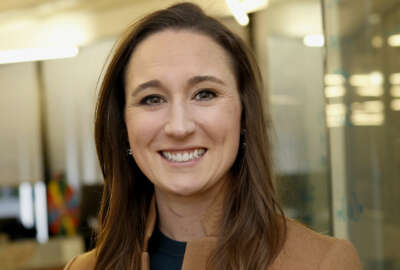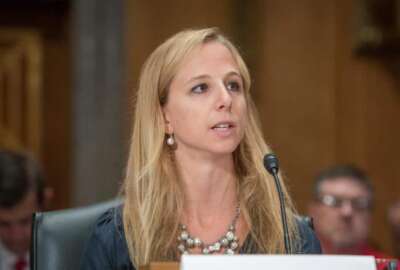
The newest batch of Presidential Innovation Fellows
They're smart. They're idealistic. They want to help. But they've only got a year. They're the latest class of Presidential Innovation Fellows.
Best listening experience is on Chrome, Firefox or Safari. Subscribe to Federal Drive’s daily audio interviews on Apple Podcasts or PodcastOne.
They’re smart. They’re idealistic. They want to help. But they’ve only got a year. They’re the latest class of Presidential Innovation Fellows, nearly three dozen technology practitioners and entrepreneurs just assigned to agencies across the government to help with modernizing and deploying new digital services. With more about the program, its executive director Josh Di Frances joined Federal Drive with Tom Temin.
Interview transcript:
Tom Temin: Mr. Di Frances, good to have you on.
Josh Di Frances: Thanks Tom. Glad to be here.
Tom Temin: Just review for us, the PIF, the Presidential Innovation Fellows, just review for us what the program is basically all about.
Josh Di Frances: Yeah, so the Presidential Innovation Fellows was started in 2012 in the White House Office of Science and Technology Policy. And the goal at the time was really to kind of bring in the best technologists and innovators from the private sector into government and pair them up with agency leaders to really help kind of catalyze innovation, and bring in new technology within federal agencies across government. We’ve been doing that for the last eight years now. And we’ve brought in over 193 fellows across 45 plus agencies, really working to improve technology for hundreds of millions of Americans.
Tom Temin: And I guess it’s noteworthy that this is a program which has survived from the Obama to the Trump administration, where, let’s say there have been policy differences in other areas. But this program seems to enjoy the support of whoever.
Josh Di Frances: Yeah, so the program is based now, in 2013 it moved over and it’s based in GSA, the General Services Administration within TTS, technology transformation services group. And really, we’re a nonpartisan program. So we’re working with career federal leaders to drive change across the government, modernize technology, we’ve had really, really great support both in obviously, in the administration that we were started within in 2012, through 2016. And then we were signed into law by President Obama in 2017. And we’ve continued to have great support from key leaders in the White House over the past few years as well, the Office of Science and Technology Policy from the US Chief Technology Officer and Office of American Innovation.
Tom Temin: And just give us the flyover description of this year’s cohort, you’ve got 34 people, each one with an individual bio, but how would you characterize them?
Josh Di Frances: Yeah, so it’s a really diverse group, we’re incredibly excited. Some of the things that stand out, obviously, it’s the most diverse cohort yet, they’re starting in a fully virtual environment, which is a pivot for us. Usually, they come they start in DC, obviously, with what’s going on in the world, we didn’t feel like that made sense and was safe. And so they’re starting virtually, but this group coming with experience in artificial intelligence, data science, product management, digital marketing, health innovation, customer experience and design. They’re from all over the United States. kind of all across, which is exciting to see kind of the diversity there. They’ve doubled down really on the AI emphasis we have this past year. And really, that’s because we’ve seen increased demand across government for experts with backgrounds in data science and artificial intelligence, machine learning. And so we wanted to kind of help fill those gaps in government by bringing in amazing fellowships and 12 of the 26 projects we have focus on AI. And those are things like computer vision, natural language processing, neural networks, advanced predictive and prescriptive analytics. And there’s just so much opportunity for AI. So some of the things that the folks are working on, are really working to combat hiring biases at Department of Labor, protecting human health in the environment, advancing COVID-19 diagnostics, and more. And they’ll kind of work with these agency leaders to drive for a change. And we also have folks not in AI, don’t want to kind of overemphasize AI. There’s a lot of folks who have expertise in in product and Human Centered Design, entrepreneurship. We even have a really interesting project this year in digital advertising at FTC, really helping kind of better understand digital advertising there so that they can protect consumers in the rapidly evolving world of digital media that’s changing a lot.
Tom Temin: So it sounds like they work on projects, both to improve agency process itself, as in the case of hiring without bias, but also in what agencies deploy to the public, as this new generation of digital services powered with AI and data start to become pretty much the currency of the government.
Josh Di Frances: Yeah, absolutely. So there’s a mix of projects, some are directly citizen facing and really working to improve services and experiences for citizens. We have a lot of work at the VA around reducing the benefit time for veterans, things like that. But those other things are really focused on kind of helping bringing technology into agencies so that federal leaders can better use it helping to streamline things in federal agencies. So it’s quite a lot of different types of projects we take on.
Tom Temin: And what does it take to become a Presidential Innovation Fellow?
Josh Di Frances: Great question. So we look for a seasoned leader. So it’s not kind of an early career fellowship. We’re looking for people with at least eight to ten years experience in the private sector who have demonstrated success. Some have much more. We’ve had folks come out of retirement, we’ve had folks kind of in between — and so it’s a mid to senior career fellowship. And then we’re looking for folks that have expertise in one of kind of the areas that we focus on. So things like data science, engineering, very technical areas, design, entrepreneurship, digital strategy product is another big one. So really, we’re looking for someone that has kind of this core expertise, they demonstrate success externally in the private sector in this area, but also they’ve some of the softer skills, they’re seasoned leaders, they have humility, they have high emotional intelligence, they can come in and take on kind of high level projects, work with senior leaders, but also all the way down with more junior folks. And so really kind of robust backgrounds.
Tom Temin: And how are they chosen?
Josh Di Frances: So we do a broad open kind of call for applications. And so we look for those areas of expertise. We leverage our current fellows and our team to interview and narrow down to group of finalists. And then concurrent to that process, we line up projects at agencies. And so we’ll work with agencies, a lot of agencies submit projects, we decide which ones are the best fit for the program. And ultimately, the agencies get to interview the finalists. So we’ve narrowed down say you want a product lead for a major program, we’ll narrow down to a group of amazing product leaders, we’ll send them over and the agency gets to interview and select who they want to bring on.
Tom Temin: Got it. And they are there just for a year, do they get paid for the year?
Josh Di Frances: They do. So we bring in fellows at a pretty senior level. I think early on when they started this fellowship in 2012, they realized that we needed to make it competitive, we needed to position the fellows within agencies in a senior role so that they had influence. So we bring them on at the GS 15 level in DC. That’s about $143,000. Yes, they do get paid.
Tom Temin: And over the years, have you had any of them that decide, you know I really like this, is there some way I can stay in the government? And is there a process to allow that should both sides agree?
Josh Di Frances: Yes. So there is. So it is initial one year fellowship, there’s an opportunity to extend for the second year, and we see most agencies and fellows opt in, they have to mutually opt in for that and about 80% stay on for the second year, which is great. And then after the second year, we see a lot of fellow stay on in government, over 50% stay on a lot of them have taken leadership roles, agencies like CTO, agencies like the VA, or deputy us CTO, really senior roles, which is exciting to see. We don’t directly facilitate them staying on in government in any way. I think folks just come in, they get excited about the mission about the opportunity, and agencies kind of look for ways to bring them on.
Tom Temin: And you yourself have a pretty impressive pedigree in the private sector in technology deployment before coming here. How long have you been at GSA and how did you find your way into the PIF?
Josh Di Frances: Thanks Tom. Yeah, so I actually didn’t have government on my radar initially. I was in the private sector, I worked actually at the intersection of technology and healthcare, and the biotech side and academic medicine. And then most recently on the kind of venture capital partnership side at a big fortune five, and I was pretty plugged in Boston in the healthcare technology ecosystem. And I heard about this program, I thought it sounded really cool. I knew a couple amazing women in Boston that became fellows and we’re kind of rock stars in the healthcare world over there and just got excited. And when a role opened up, I reached out and applied and it just worked out. So I’ve been thrilled. It’s been incredible journey. Been here a little over three years now. And yeah, very thankful for the opportunity.
Tom Temin: So you know what it’s like to work in the government office and also to telework yourself.
Josh Di Frances: I do in about March, all kind of GSA employees went fully virtual. So with over six months in now, working remotely,
Tom Temin: Alright, Joshua Di Frances is executive director of the Presidential Innovation Fellows Program at the GSA. Thanks so much for joining me.
Josh Di Frances: Thanks, Tom. Really enjoyed it.
Copyright © 2025 Federal News Network. All rights reserved. This website is not intended for users located within the European Economic Area.
Tom Temin is host of the Federal Drive and has been providing insight on federal technology and management issues for more than 30 years.
Follow @tteminWFED





